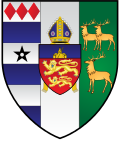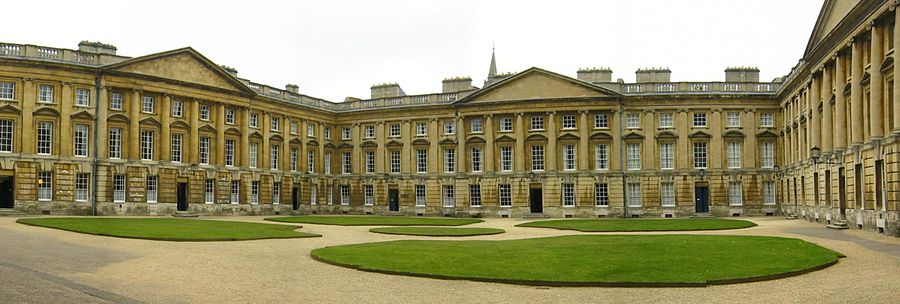Portal:University of Oxford
| Main page | Indices | Projects |
The University of Oxford portal
The University of Oxford is a collegiate research university in Oxford, England. There is evidence of teaching as early as 1096, making it the oldest university in the English-speaking world and the world's second-oldest university in continuous operation. It grew rapidly from 1167, when Henry II banned English students from attending the University of Paris. After disputes between students and Oxford townsfolk in 1209, some academics fled north-east to Cambridge where they established what became the University of Cambridge. The two English ancient universities share many common features and are jointly referred to as Oxbridge.
The University of Oxford is made up of thirty-nine semi-autonomous constituent colleges, four permanent private halls, and a range of academic departments which are organised into four divisions. Each college is a self-governing institution within the university, controlling its own membership and having its own internal structure and activities. All students are members of a college.
It does not have a main campus, but its buildings and facilities are scattered throughout the city centre. Undergraduate teaching at Oxford consists of lectures, small-group tutorials at the colleges and halls, seminars, laboratory work and occasionally further tutorials provided by the central university faculties and departments. Postgraduate teaching is provided in a predominantly centralised fashion.
Oxford operates the Ashmolean Museum, the world's oldest university museum; Oxford University Press, the largest university press in the world; and the largest academic library system nationwide. In the fiscal year ending 31 July 2023, the university had a total consolidated income of £2.92 billion, of which £789 million was from research grants and contracts.
Oxford has educated a wide range of notable alumni, including 30 prime ministers of the United Kingdom and many heads of state and government around the world. 73 Nobel Prize laureates, 4 Fields Medalists, and 6 Turing Award winners have matriculated, worked, or held visiting fellowships at the University of Oxford, while its alumni have won 160 Olympic medals. Oxford is the home of numerous scholarships, including the Rhodes Scholarship, one of the oldest international graduate scholarship programmes. (Full article...)
Selected article
The Neda Agha-Soltan Graduate Scholarship is a scholarship for post-graduate philosophy students at The Queen's College (pictured), with preference given to students of Iranian citizenship or heritage. It was established in 2009 following the death of Neda Agha-Soltan, an Iranian philosophy student, in the street protests that followed the disputed Iranian presidential election. The college received offers from two anonymous donors to establish a scholarship, followed by many individual donations from members of the public and former students of Queen's. The Iranian embassy in London told the college that the university was involved in a "politically motivated campaign... in sharp contract with its academic objectives". In response, The Times praised the scholarship, saying that the establishment of the scholarship was indeed politically motivated, "and admirably so", given the regime's reaction to her death and continuing problems in Iran. The college has denied that it took a political decision in establishing the scholarship, arguing that refusing the donations would itself have been a political act. Anonymous British diplomatic sources were reported as saying that the scholarship put "another nail into the coffin" of relations between Britain and Iran. (Full article...)
Selected biography
Selected college or hall
Lincoln College was founded in 1427 by Richard Fleming, Bishop of Lincoln, as a "little college of true students of theology". After some early financial problems, another Bishop of Lincoln, Thomas Rotherham, effectively refounded the college in 1478. It is situated in the centre of the city on Turl Street and adjoins Brasenose College (with which it has a long-standing rivalry) at the rear. The college buildings include the 18th-century All Saints Church which has been converted into a library. The architectural historian Nikolaus Pevsner said that Lincoln preserves "more of the character of a 15th century college than any other in Oxford". Unlike many other colleges, there are no modern buildings on the main site. There are about 580 students (undergraduates and postgraduates). The Rector of the college is the English literature academic Henry Woudhuysen, appointed in 2012. The Methodist leader John Wesley was a Fellow of Lincoln in the 18th century. Former students of the college include the novelist John le Carré, the actress Emily Mortimer, the cartoonist "Dr Seuss" and the Australian politician Peter Durack. (Full article...)
Selected image

Did you know
Articles from Wikipedia's "Did You Know" archives about the university and people associated with it:
- ... that Kenelm Hubert Digby was the proposer of the notorious 1933 "King and Country" debate in the Oxford Union (debating chamber pictured)?
- ... that the Oxford University Ice Hockey Club claims to be the second oldest ice hockey team in the world?
- ... that Christopher Elrington, general editor of the Victoria County History, was a professor at the University of London even though he never taught there?
- ... that the position of Laudian Professor of Arabic was established at Oxford by William Laud, the Archbishop of Canterbury?
- ... that Gwilym Davies was the first person to broadcast in Welsh, on Saint David's Day in 1923?
Selected quotation
Selected panorama
Wikimedia
The following Wikimedia Foundation sister projects provide more on this subject:
-
Commons
Free media repository -
Wikibooks
Free textbooks and manuals -
Wikidata
Free knowledge base -
Wikinews
Free-content news -
Wikiquote
Collection of quotations -
Wikisource
Free-content library -
Wikiversity
Free learning tools -
Wikivoyage
Free travel guide -
Wiktionary
Dictionary and thesaurus















